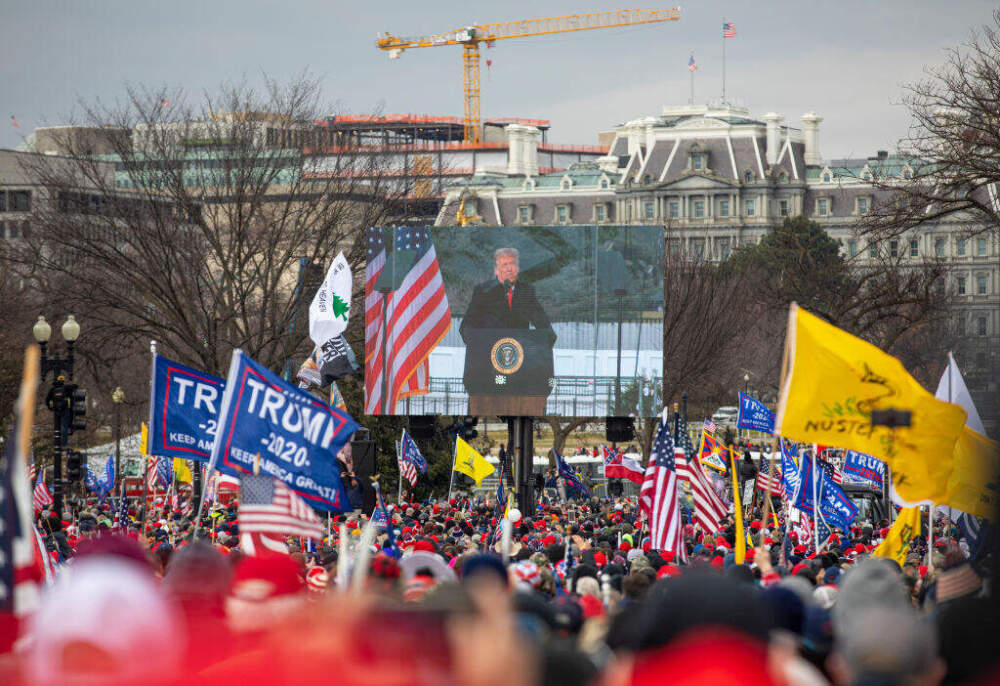Advertisement
Commentary
The Supreme Court just handed Trump a new shield: 'official-acts immunity'

A partisan Supreme Court on Monday gave a green light to presidents of the United States to engage in criminal conduct in office without fear of prosecution.
As long as his actions fall within his “official” duties, a president is immune from legal consequences that would befall any other American citizen. As a practical matter, the high court’s 6-to-3 ruling along ideological lines almost certainly ensures that Donald Trump will not stand trial before the November election on charges that he used his office to try to reverse the results of the 2020 presidential contest, which he lost to Joe Biden by more than seven million votes.
The case against the former president will go back to the lower court where U.S. District Court Judge Tanya Chutkan must determine whether the four counts against Trump alleged in the federal indictment were official or private acts. That delay likely ensures that any trial of the 45th president on conspiring to defraud the United States, to obstruct the formal certification of Biden’s victory and to violate the public’s right to vote will likely not take place before the election in November, when Trump is presumed to be the Republican nominee.
Mission accomplished.

It has been 10 months since Trump was indicted on criminal charges arising from Special Counsel Jack Smith’s investigation of the violent attack on the U.S. Capitol on Jan. 6, 2021. Trump has used every procedural delay available to ensure the case would not be brought to trial before this fall’s election, the presumption being that, if elected, he will order the Department of Justice to dismiss the charges against him.
From the first, the Supreme Court has been complicit in that transparent strategy. In upholding Judge Chutkan’s rejection of the former president’s claim of absolute immunity, the U.S. Court of Appeals for the District of Columbia rightly dismissed as absurd Trump’s claim that he cannot be tried on criminal charges because he was acquitted by a Republican-controlled Senate in his impeachment trial of similar allegations.
Noting that impeachment is a political proceeding, not a criminal prosecution, the court wrote that “It would be a striking paradox if the President, who alone is vested with the constitutional duty to ‘take Care that the Laws be faithfully executed,’ were the sole officer capable of defying those laws with impunity.
“Former President Trump’s alleged efforts to remain in power despite losing the 2020 election were, if proven, an unprecedented assault on the structure of our government. He allegedly injected himself into a process in which the President has no role — the counting and certifying of the Electoral College votes — thereby undermining constitutionally established procedures and the will of the Congress.”
The Supreme Court swept aside [the appeals court's] existential concerns, insisting that a president’s "need for boldness” takes precedence over the need for need for accountability and restraint.
It took the high court four months to review Trump’s immunity claim and until the final day of its session to issue today’s decision. The Warren Burger Court managed to issue a unanimous ruling ordering President Richard Nixon to turn over the Oval Office tapes to special prosecutors only 17 days after oral arguments about Nixon’s futile claim of executive privilege during the Watergate scandal.
“We cannot accept former President Trump’s claim that a President has unbounded authority to commit crimes that would neutralize the most fundamental check on executive power — the recognition and implementation of election results,” the appeals court wrote. “Nor can we sanction his apparent contention that the Executive has carte blanche to violate the rights of individual citizens to vote and to have their votes count. At bottom, former President Trump’s stance would collapse our system of separated powers by placing the President beyond the reach of all three Branches.”
The Supreme Court swept aside those existential concerns, insisting that a president’s “need for boldness” takes precedence over the need for need for accountability and restraint.
Advertisement
The implications of this decision extend far beyond the role Donald Trump played in pressuring state officials to change vote totals and inciting an insurrection at the U.S. Capitol. In a stinging dissent, Justice Sonia Sotomayor excoriated the conservative majority for a decision that “makes a mockery of the principle, foundational to our Constitution and system of Government, that ‘no man is above the law.’ ”
The conservative majority that regularly crows about its fealty to the original intent of the drafters of the U.S. Constitution have ignored the explicit counsel of the Founders.
It is Sotomayor in her dissent, joined by Justices Elena Kagan and Katanji Brown Jackson, who relies on their guidance, citing Federalist Paper No. 69. “The historical evidence that exists on Presidential immunity from criminal prosecution cuts decisively against it,” she wrote. “For instance, Alexander Hamilton wrote that former Presidents would be ‘liable to prosecution and punishment in the ordinary course of law.’ For Hamilton, that was an important distinction between ‘the king of Great Britain,’ who was ‘sacred and inviolable,’ and the ‘President of the United States,’ who ‘would be amenable to personal punishment and disgrace.’ In contrast to the king, the President should be subject to ‘personal responsibility’ for his actions.”
In writing for the majority, Chief Justice John Roberts “effectively creates a law-free zone around the President, upsetting the status quo that has existed since the Founding,” Sotomayor wrote. “This new official-acts immunity now lies about like a loaded weapon for any President that wishes to place his own interests, his own political survival, or his own financial gain, above the interests of the Nation. The President of the United States is the most powerful person in the country, and possibly the world. When he uses his official powers in any way, under the majority’s reasoning, he now will be insulated from criminal prosecution. Orders the Navy’s Seal Team 6 to assassinate a political rival? Immune. Organizes a military coup to hold onto power? Immune. Takes a bribe in exchange for a pardon? Immune. Immune, immune, immune.”
The high court has handed Trump the weapon he will wield to shield himself from accountability.
With no apparent irony, the former president — who repeatedly threatens on the campaign trail to jail his political opponents — argued that only absolute immunity would protect presidents from politically motivated prosecutions after they leave office.
He has promised to return to the White House “a dictator” on “Day One.” An historically ignorant, ethically bankrupt and politically motivated Supreme Court has ensured that a re-elected Donald Trump would be empowered, as he has always been emboldened, to exploit his office to enrich himself, to punish his opponents and to destroy what remains of American democracy.
